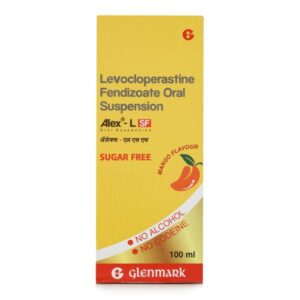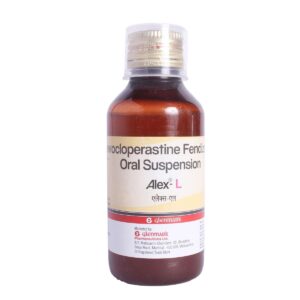PHENYLPROPANOLAMINE + CHLORPHENIRAMINE MALEATE + LEVOCLOPERASTINE
Phenylpropanolamine: Phenylpropanolamine (PPA) is a medication primarily used as a decongestant. It is a sympathomimetic amine that stimulates the alpha-adrenergic receptors in the respiratory tract and blood vessels, causing vasoconstriction and reducing nasal congestion.
PPA is available in various forms such as tablets, capsules, and syrups. It is commonly used to relieve symptoms of congestion caused by conditions like the common cold, sinusitis, and allergic rhinitis. It may also be used for other purposes as determined by a healthcare professional.
The recommended dose of PPA may vary depending on the formulation and the individual’s age and condition. It is important to follow the instructions provided by the healthcare professional or check the medication package for recommended dosing guidelines.
While Phenylpropanolamine is generally considered safe when used as directed, it may cause some side effects. Common side effects of PPA may include increased heart rate, elevated blood pressure, nervousness, restlessness, headache, dizziness, insomnia, and gastrointestinal disturbances such as nausea and vomiting.
In rare cases, PPA has been associated with serious adverse effects, including stroke, heart attack, and hemorrhagic stroke. Due to these risks, the United States Food and Drug Administration (FDA) withdrew marketing approval for PPA-containing products in 2000. Therefore, it is not available for purchase in many countries.
It is essential to consult with a healthcare professional before using PPA or any other medication to ensure it is appropriate for your individual needs and does not interfere with any pre-existing medical conditions or interact with other medications.
Chlorpheniramine Maleate: Chlorpheniramine maleate is an antihistamine drug used to relieve symptoms associated with allergic conditions such as hay fever, hives, and allergic rhinitis. It is also commonly used to treat symptoms of the common cold, such as sneezing, runny nose, and itchy, watery eyes.
The mechanism of action of Chlorpheniramine maleate is to block the effects of histamine, a substance released by the body during an allergic reaction. By blocking the histamine receptors, Chlorpheniramine helps to reduce the symptoms of allergies.
The dose of Chlorpheniramine maleate varies depending on the age and condition being treated. For adults and children over 12 years old, the usual recommended dose is 4 mg every 4 to 6 hours, not exceeding 24 mg in 24 hours. For children aged 6 to 12 years old, the usual dose is 2 mg every 4 to 6 hours, not exceeding 12 mg in 24 hours.
Like any medication, Chlorpheniramine maleate may cause side effects. Common side effects include drowsiness, dizziness, dry mouth, blurred vision, constipation, and urinary retention. These side effects are typically mild and go away on their own. However, if these symptoms persist or worsen, it is important to consult a healthcare professional.
Some individuals may experience more severe side effects, such as confusion, hallucinations, rapid heartbeat, difficulty urinating, or seizures. If any of these occur, immediate medical attention should be sought.
Chlorpheniramine maleate should be used with caution in individuals with certain conditions such as glaucoma, asthma, heart disease, or urinary problems. It is important to consult a healthcare professional before taking this medication to ensure it is safe and appropriate for use. Additionally, it may interact with other medications, so it is crucial to inform the healthcare provider of any other medications being taken to avoid potential drug interactions.
Levocloperastine: Levocloperastine, also known by its brand name Husteel, is an antitussive and expectorant medication used for the treatment of cough due to various conditions, including acute and chronic bronchitis, tracheobronchitis, and upper respiratory tract infections.
The exact mechanism of action of levocloperastine is not fully understood. It is believed to work by suppressing cough reflex sensitivity, reducing spasms in the respiratory tract, and helping to expel excessive mucus from the airways. It also has an anti-inflammatory effect, which can help in reducing airway irritation and improving symptoms.
The usual recommended dose of levocloperastine is 20 mg to be taken orally three times a day. However, the dosage may vary depending on the severity of the cough and the individual’s age and weight. It is important to follow the instructions provided by the healthcare professional or stated on the packaging.
Common side effects of levocloperastine may include drowsiness, dizziness, headache, nausea, and gastrointestinal disturbances such as vomiting or diarrhea. These side effects are generally mild and temporary. However, if any severe or persistent side effects occur, it is important to seek medical attention.
As with any medication, levocloperastine may interact with other drugs. It is important to inform the healthcare professional about any other medications, supplements, or herbal products being taken to avoid any potential interactions.
Overall, levocloperastine is a medication used to alleviate cough symptoms and promote respiratory comfort. It is important to use it as prescribed by a healthcare professional and report any concerns or side effects experienced during its use.


